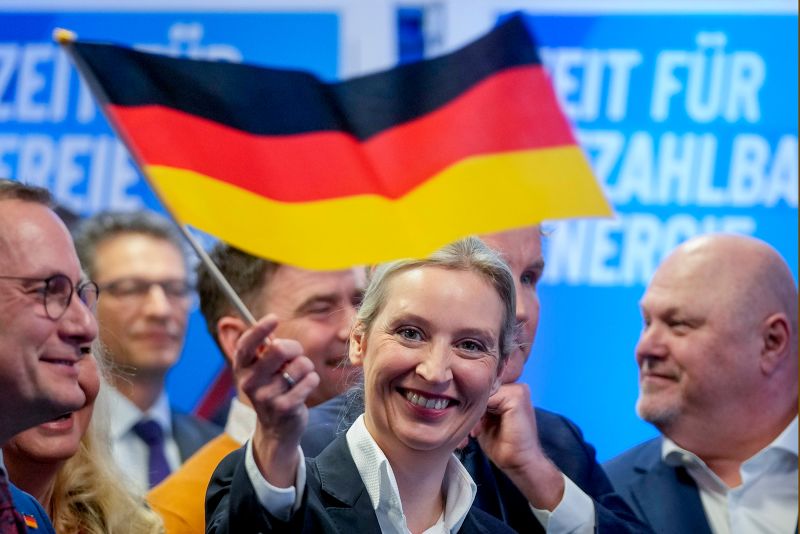
Germany’s far-right may be frozen out of power, but the AfD is now a powerful force
Germany’s political system is set up to exclude extremists. Yet the country is waking up to a new political reality that has lurched to the right with the once outcast Alternative for Germany (AfD) party now firmly established in German politics.
The country’s mainstream conservatives, as polls predicted, won the largest share of votes in Sunday’s election according to official preliminary results and will be looking to form the next government, while the AfD came in second. But make no mistake – second place is a huge result for a party that although it likely won’t be in office once the dust settles, will enjoy expanded influence.
The party has doubled its support since the previous election in 2021, when it received 10.3% of the vote. It is now the first far-right party in Germany’s post-World War II history to have attained such broad levels of public popularity, and it has also significantly increased its share of seats in Germany’s parliament, or Bundestag.
The AfD reached a particularly large number of voters in eastern Germany, where it has long had a stronghold. But it also gained some significant support in constituencies in the country’s west, including the industrial city of Gelsenkirchen which has been suffering with stagnating economy and high unemployment, and Kaiserslautern, which is surrounded by a number of US military installation, including the Ramstein Air Base.
“We have never been stronger – we are the second-biggest force,” AfD co-leader Alice Weidel gloated, as she addressed crowds in Berlin after exit poll results were revealed on Sunday evening.
The mood at the far right’s election party in Berlin was ecstatic as the exit polls first flashed onto the screens, with people cheering and waving Germany flags.
For his part, Christian Democratic Union (CDU) leader and Germany’s likely next chancellor Friedrich Merz claimed victory as he slammed US interference in the country’s election campaign – which saw high-profile figures from the Trump administration speak out in support of the AfD.
These interventions are “no less dramatic and drastic and ultimately outrageous than the interventions we have seen from Moscow,” Merz said.
Formed in reaction to Eurozone policies in 2013, the AfD had become accustomed to being on the fringe of German politics, in a country scarred by its Nazi past and where any far-right party has been treated with caution.
It only secured its first seats in the Bundestag in 2017 and struggled to find a platform on Germany’s traditional media due to its strident anti-migrant and anti-Islam rhetoric. This election marks the first time the party has ever fielded a candidate for chancellor.
The party has called for “remigration” – the mass expulsion of immigrants. The controversial policy has drawn comparisons to the Nazi era. The AfD is officially suspected of right-wing extremism by German authorities, and parts of it have been under government surveillance.
All that appears to have changed. The AfD is now Germany’s largest opposition party, making it a major political contender that cannot be ignored. It has driven the debate in Germany while forcing mainstream rivals to recognize that they need to do more on flashpoint issues if they want to retain votes.
Their rise reflects what has been happening across Europe where a host of hard-right parties have made gains. Whether in the Netherlands, France or Austria, such parties can no longer easily be dismissed as political outcasts when they have won over sizeable shares of the vote – or in the case of Italy, run the country.
Having a significant voice in parliament means that “they [the AfD] will be able to apply pressure on the major parties from a position of greater strength,” said Gemma Loomes, a Lecturer in Comparative Politics at Keele University.
“The surge in support will embolden the party to talk, perhaps even more aggressively, about the issues that matter most to them but that the major parties are reluctant to address,” Loomes added.
All this begs the question: can the so-called “firewall” – an unofficial agreement between Germany’s mainstream parties to band together to keep the AfD out of power – last?
Merz’s controversial decision to push through an immigration bill with help from the AfD in January could be an early indication of how he intends to proceed in his chancellery.
She believes there may already be a “crack” in the firewall.
“In five, or 10, or 15 years it may no longer be there,” she speculates, perhaps at the regional level initially, if not the national level.
“The real question for center parties is how do we address voters’ genuine grievances, and how do we do it in a way that doesn’t just amplify the far right.”
Meanwhile, AfD politicians already have their sights firmly set on the next election in 2029 – when they are determined the firewall” will no longer exist.
Similarly, Weidel told reporters in Berlin on Monday morning, “Friedrich Merz has decided to maintain his blockade stance towards the AfD. We consider this blockade to be undemocratic. You cannot exclude millions of voters per se.”
Merz’s right-wing pivot ‘fraught with danger’
Merz now faces a tightrope walk as he seeks to form a new government while carving out a new path for the CDU.
The CDU has been ever-present in Germany’s post-war era and oversaw the reunification of east and west.
Yet, at the same time, everything has changed since it was last in power.
No longer tied with the liberal, “open door” policies it became synonymous with under Angela Merkel, Merz has vowed to bring the party back to its more conservative roots as part of efforts to counter the far right.
However, Merz’s promise to pivot the CDU back to the right does not come without risks. The move threatens to further embolden the AfD while isolating the CDU’s more centrist supporter base.
For Loomes, it is a decision that is “fraught with danger.”
“The AfD currently has positioned itself as the only party willing to talk about immigration and to propose radical action to tackle the perceived problem,” she said.
“If the CDU positions itself in this space, it risks being perceived as a less authentic version of the AfD. Voters are convinced the AfD cares passionately about limiting immigration; they may be less convinced it is a genuine priority for the CDU.”
Merz’s new government will likely involve the other major centrist party, the center-left Social Democrats (SPD), which led Germany’s previous coalition and came out third in Sunday’s vote.
However, coalition building could prove difficult, with the two parties potentially clashing on key issues, particularly foreign policy. There are no guarantees that the new government will not be as incohesive and unable to govern as the previous coalition.
Transatlantic winds
While Germany has long held far-right parties with a disdain not seen in its European neighbours, some Germans believe the time has come to break old taboos.
And the AfD’s powerful transatlantic ally is only serving to bolster this view.
Tech billionaire Elon Musk addressed crowds during a surprise appearance at the AfD campaign launch in January. “There is too much focus on past guilt, and we need to move beyond that,” he said, in a speech that echoes AfD talking points and was met with rapturous applause.
Meanwhile, in a scathing speech at the Munich Security Council, US Vice President JD Vance told Europe’s leaders that there is “no room for firewalls” in a democracy, a clear nod to the AfD.
Merz will have to contend with a Trump administration that has praised a key rival and appears set on dismantling long-term security ties between Europe and the US.
A strong Berlin government and a united Europe now seems more important than ever. The continent is searching for leadership as Trump moves ahead on Ukraine peace talks without its involvement.
For Merz, Europe’s independence from the US is a prime concern. “My absolute priority will be to strengthen Europe as quickly as possible so that, step by step, we can really achieve independence from the USA,” he said at a televised roundtable with other party leaders Sunday evening.
While Germany’s mainstream has held off a radical far-right government, Merz’s challenges are only just beginning.
